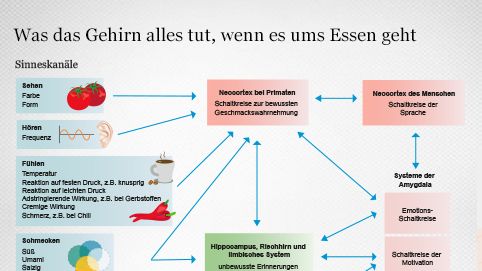Prof. Dr. Wolfgang Meyerhof
PromotionWolfgang Meyerhof promovierte 1984 am Institut für Molekularbiologie und Biochemie der Freien Universität Berlin. Später forschte er am Institut für Zellbiochemie und Klinische Neurobiologie des Universitätskrankenhauses Eppendorf auf dem Gebiet der molekularen Neuroendokrinologie. Derzeit leitet Meyerhof die Abteilung Molekulare Genetik am Deutschen Institut für Ernährungsforschung in Potsdam-Rehbrücke. Sein Forschungsschwerpunkt ist die Bedeutung des Geschmackssinns für die Regulation der Nahrungsaufnahme. In seiner Arbeit entdeckte er wichtige Funktionsprinzipien von Geschmacksrezeptoren und rezeptorspezifischen Geschmacksmodulatoren.
Arbeitsschwerpunkt:
Molekulare Neurobiologie
Ausbildung:
Studium der Biochemie
Abschluss:
Promotion
Position / Tätigkeit:
Abteilungsleiter
Homepage:
http://www.dife.de/de/index.php?request=/de/forschung/abteilungen/kurzprofil.php?abt=MOGE&kst=KR1101
Kusuhara, Y., Yoshida, R., Ohkuri, T., Yasumatsu, K., Voigt, A., Hübner, S., Maeda, K., Boehm, U., Meyerhof, W., Ninomiya, Y.: Taste responses in mice lacking taste receptor subunit T1R1 . J. Physiol. 591, 1967-1985 (2013).
Soares, S., Kohl, S., Thalmann, S., Mateus, N., Meyerhof, W., De Freitas, V.:
Different phenolic compounds activate distinct human bitter taste receptors. J. Agric. Food Chem. 61, 1525-1533 (2013).
Behrens, M., Gunn, H. C., Ramos, P. C. M., Meyerhof, W., Wooding, S. P.: Genetic, functional, and phenotypic diversity in TAS2R38-mediated bitter taste perception. Chem. Senses 38, 475-484 (2013).
Behrens, M., Meyerhof, W.: Bitter Taste Sensitivity in Humans and Chimpanzees. In: eLS. John Wiley & Sons Ltd, Chichester. http://www.els.net [doi: 10.1002/9780470015902.a0020778.pub2] (Jun 2013) (2013).
Born, S., Levit, A., Niv, M. Y., Meyerhof, W., Behrens, M.: The human bitter taste receptor TAS2R10 is tailored to accomodate numerous diverse ligands. J. Neurosci. 33, 201-213 (2013).
Hellfritsch, C., Brockhoff, A., Stähler, F., Meyerhof, W., Hofmann, T.:
Human psychometric and taste receptor responses to steviol glycosides. J. Agric. Food Chem. 60, 6782-6793 (2012).
Hillmann, H., Mattes, J., Brockhoff, A., Dunkel, A., Meyerhof, W., Hofmann, T.:
Sensomics analysis of taste compounds in balsamic vinegar and discovery of 5-acetoxymethyl-2-furaldehyde as a novel sweet taste modulator. J. Agric. Food Chem. 60, 9974-9990 (2012).
Meyer, D., Voigt, A., Widmayer, P., Borth, H., Huebner, S., Breit, A., Marschall, S., Hrabé de Angelis, M., Boehm, U., Meyerhof, W., Gudermann, T., Boekhoff, I.: Expression of Tas1 taste receptors in mammalian spermatozoa: functional role of Tas1r1 in regulating basal Ca²? and cAMP concentrations in spermatozoa. PLoS ONE 7(2):e32354 Open Access (2012).
Galindo, M. M., Voigt, N., Stein, J., van Lengerich, J., Raguse, J.-D., Hofmann, T., Meyerhof, W., Behrens, M.: G protein-coupled receptors in human fat taste perception. Chem. Senses 37, 123-139 (2012).
Poirier, N., Roudnitzky, N., Brockhoff, A., Belloir, C., Maison, M., Thomas-Danguin, T., Meyerhof, W., Briand, L.: Efficient production and characterization of sweet-tasting brazzein secreted by the yeast Pichia pastoris. J. Agric. Food Chem. 60, 9807-9814 (2012).
Meyerhof, W., Behrens, M.: Feinschmecker gesucht. Die Molekularbiologie des Bittergeschmacks. labor&more Heft 4, 52-53 (2006).
Behrens, M., Meyerhof, W.: Die Bittergeschmacksrezeptoren des Menschen. Bioforum 5/2005, 26-27 (2005).
Meyerhof, W.: Auf der Zunge zergehen lassen. Spiegel Special Nr. 5, 116-117 (2005).
Deutsches Institut für Ernährungsforschung Potsdam-Rehbrücke
Öffentliche ForschungInstitut:
Abteilung Molekulare Genetik
Arbeitsschwerpunkt:
Molekulare Neurobiologie, Neurowissenschaften Allgemein
Anschrift:
Arthur-Scheunert-Allee 114-116
14558 Nuthetal
DE
Telefon:
+49(0)33200 88 2545
E-Mail:
Nancy.Ewert@dife.de
Homepage:
http://www.dife.de/

